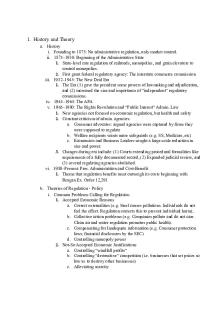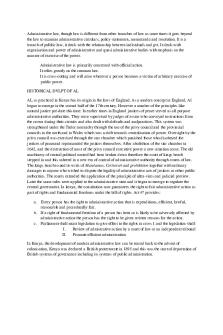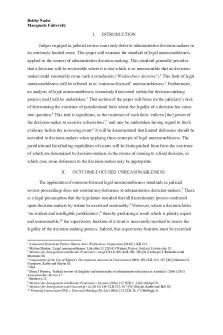Administrative Law - Essay PDF

| Title | Administrative Law - Essay |
|---|---|
| Course | Administrative Law |
| Institution | Macquarie University |
| Pages | 5 |
| File Size | 133.1 KB |
| File Type | |
| Total Downloads | 58 |
| Total Views | 167 |
Summary
Download Administrative Law - Essay PDF
Description
45634416 ASSESSMENT 1 Q. In Minister for Immigration and Border Protection v Stretton (2016) 237 FCR 1, Griffiths J observed that: ‘Within the bounds of legal unreasonableness, there “is an area within which a decision-maker has a genuinely free discretion”… It is critical that, in exercising a judicial review function, the courts not exceed “their supervisory role by undertaking a review of the merits of an exercise of discretionary power”… Application of a standard of legal unreasonableness “does not involve substituting a court’s view as to how a discretion should be exercised for that of a decisionmaker”.’ In that context, to what extent should judges engaged in judicial review defer to administrative decision-makers? A Introduction The judicial review by a court holds public officials accountable for the correct exercise of their powers, rather than the fairness of their decision with reference to the merits of the case.1 When discussing judicial review, the term deference is widely viewed as it refers to a court giving weight to a judgment or opinion of government in circumstances of normative or empirical uncertainty.2 Hayne J believes that ‘if a task is validly committed to the courts, it is the duty of the courts to perform it’.3 This research essay will assess and analyse arguments that highlight the effectiveness of judges engaged in judicial review deferring to administrative decision-makers through: 1. Jurisdictional fact; 2. Deference under expertise and
1 Attorney-General’s Department, Australian Administrative Law Policy Guide (2012) 5.
2 Caroline Henckels, ‘Proportionality and the Separation of Powers in Constitutional Review: Examining the Role of Judicial Deference’ (2017) Federal Law Review 45(2). 3 Justice Kenneth Hayne, 'Deference - An Australian Perspective' (2011) Public Law Review 75. 1 Word Count: 1458
3. Deference maintains a separation of powers and reduces jurisdictional error. With analytical discussion of these above arguments, discretion and fact will be used as a counter argument to critically evaluate the extent that judges should defer to administrative decisionmakers.
B Jurisdictional Fact Jurisdictional fact can be seen as the purpose in ensuring that an administrative decision-maker is seen as adequate and just in accordance with a statute. Jurisdictional facts are merely facts that must exist objectively before a statutory power can be exercised by a decision-maker. A common day to day example of this is an authorised transport officer can close a road off only if the road is dangerous. In the aspect of this example statute, where it states that the road must be dangerous is seen to constitute a jurisdictional fact. When or if this fact can be determined, the transport officer has no jurisdiction or power in accordance to the statute. Using this example, a statute can require certain facts to exist before an administrative body (the transport officer) has jurisdiction. The Courts must determine whether those facts exist and whether the decision-maker may lawfully begin the adjudication process. Within the High Court’s decision in Plaintiff M70/2011 v Minister for Immigration and Citizenship & Anor Plaintiff M106 [2011], it was determined that under s 198A(3) of the Migration Act 1958 (Cth), a country could only meet the requirements if that country was a signatory to the Convention Relating to the Status of Refugees.4 Under this section, Malaysia was not a signatory and therefore, all of the jurisdictional facts were not satisfied resulting in the Minister not being able to make a declaration, as it was determined invalid.5 The outcome from this case was that deference was not given. Jurisdictional fact is a fundamental principle and acts as a protocol for judges which must be satisfied first before deference can be provided to an administrative decision-maker. The judges provide the power to the decision-makers and if the jurisdictional fact/s are determined as valid, then should judges defer the inquiry to a decision-maker. As a holistic approach to judicial review, it is evident that jurisdictional fact provides an obstacle that must be passed by the Courts in order for deference to occur to administrative decision-makers. As to the extent of whether judges should defer, if jurisdictional 4 Plaintiff M70/2011 v Minister for Immigration and Citizenship & Anor Plaintiff M106 [2011]
HCA 32. 5 Ibid.
2 Word Count: 1458
facts have been satisfied and validated, then there is no reason as to why judges should not defer to administrative decision-makers.
C Deference Under Expertise The second argument in analysing the extent that judges should defer to administrative decisionmakers is using expertise as a principle. As it is currently seen, deference is a judicial trend in Australia given to expert decision-makers on matters of fact and discretion. This is clearly expressed in the case of Collector of Customs v Agfa-Gevaert Ltd [1996]. From the High Court’s decision, both the terms of expertise and deference are not used. Although, the decision reads down that the High Court should accept the interpretation by the Controller of Customers to the Commercial Tariff Concession Order (CTCO), as the officer had certain expertise on the subject matter for interpreting the terms of ‘silver dye bleach reversal process’, contrasting to the Court’s limited knowledge.6 The progressive side to deference under expertise is that the administrative decision-makers have more knowledge on the subject matter of the case brought forth. This assists in promoting impartiality and Kirby J in his judgement from Minister for Immigration and Ethnic Affairs v Wu Shan Liang [1996] comments that ‘often, the decision-maker will have more experience in the consistent application of applicable administrative rules to achieve fairness to a wider range of people than typically come before the courts’.7 If a judge is unable to grasp the knowledge or have the knowledge pursuant to the facts of a case, then why should he or she adjudicate on it? This reasoning was further established by the High Court in Minister for Immigration and Ethnic Affairs v Guo [1997] where it stated that ‘the Court should attach great weight to the opinion of the tribunal in circumstances such as the field in which they operate and the extent to which its decisions are supported by disclosed processes of reasoning’.8 Referring back to the extent that judges should defer to administrative decision-makers, judges are not going to have a vast knowledge on every subject matter that comes before the Court. Thus, judges should defer to administrative decision-makers when they have limited knowledge on the facts brought forth. Deference can and will assist in creating fairness to a wider range of people on the basis of the expertise principle, promoting impartiality across judicial review.
6 Collector of Customs v Agfa-Gevaert Ltd [1996] HCA 36. 7 Minister for Immigration and Ethnic Affairs v Wu Shan Liang [1996] HCA 6. 8 Minister for Immigration and Ethnic Affairs v Guo [1997] HCA 22.
3 Word Count: 1458
D Deference Maintains a Separation of Powers and Reduces Jurisdictional Error The separation of powers doctrine administered within the first three chapters of the Australian Constitution determines the role of the three branches of government including the Parliament, Executive and Judiciary. The use of deference in maintaining an adequate separation of powers can be seen to be upheld for two valid reasons: 1. The appropriateness of respecting decisions made by constitutionally legitimate decisionmakers; and 2. Relying on the institutional competence and expertise of the other branches of government.9 Deference and the separation of powers doctrine go hand in hand with each other, reducing the potential of jurisdictional errors. In Re Refugee Tribunal; Ex parte Aala [2000], Hayne J clearly articulated that ‘there is a jurisdictional error if the decision-maker makes a decision outside the limits of the functions and powers conferred on him or her, or does something which he or she lacks power to do’.10 From the significant decision in Boilermakers’, it established that Courts could not exercise other power other than for judicial functions.11 If in circumstances where judges are brought forth to adjudicate outside their parameters of power, they should defer to an administrative decision-maker to preserve the separation of powers doctrine and reduce the possibility of a jurisdictional error from occurring. Using the decision handed down in Boilermakers’ and Hayne J’s comment, there is no valid reason as to why a judge should not defer to administrative decision-makers in cases where jurisdictional error and breaches of separation of powers could be present.
E Discretion and Fact
9 Caroline Henckels, ‘Proportionality and the Separation of Powers in Constitutional Review: Examining the Role of Judicial Deference’ (2017) Federal Law Review 45(2). 10 Re Refugee Review Tribunal; Ex parte Aala [2000] HCA 57. 11 R v Kirby; Ex parte Boilermakers’ Society of Australia [1956] HCA 10.
4 Word Count: 1458
An underlying issue that arises within judicial review and deference is that decisions are written by lawyers for other lawyers. What is meant by this comment is that the majority of public officials currently who are exercising discretionary powers are not lawyers. This is an example of a complexity issue and incomprehensibility, as judges articulate legal principles in highly technical language which to an administrative decision-maker who is lay can promote errors in jurisdiction if not analysed the correct way. In using the Wu Shan Liang case, the decision-maker had clearly stated that he found that the applicants did not have a ‘well-founded fear of persecution'.12 In coming to this decision, the decision-maker had in fact determined this by using a balance of probabilities standard and not on the ‘real chance' test advocated by Chan v Minister for Immigration and Ethnic Affairs [1989].13 Here, it is evident that the decision-maker should have used the real chance test instead of the balance of probabilities. Using Wu Shan Liang and the judgements from the High Court, it is a clear example as to how deference can cause error in the adjudication process, lessening the extent where judges should defer to administrative decisionmakers.
F Conclusion In conclusion, addressing and answering the thesis of this research essay has provided that the use of deference can preserve the power of judges given by the Australian Constitution and can uphold impartiality through the adjudication process. Although, judges must tread lightly when deferring to administrative decision-makers as there is a chance that errors in jurisdiction could become more prevalent through complexity issues and incomprehensibility from officials who are non-lawyers. As a holistic approach to judicial review, the circumstances analysed above is when judges should defer to administrative decision-makers as it creates less chances of error in the adjudication process.
12 Minister for Immigration and Ethnic Affairs v Wu Shan Liang [1996] HCA 6. 13 Chan v Minister for Immigration and Ethnic Affairs [1989] HCA 62. 5 Word Count: 1458...
Similar Free PDFs

Administrative Law - Essay
- 5 Pages

Administrative Law 70617 - Essay
- 14 Pages

Administrative Law - Admin Law
- 6 Pages

Administrative Law Outline
- 33 Pages

Administrative law (4th)
- 59 Pages

Administrative Law Outline / Summary
- 46 Pages

Administrative LAW MERITS REVIEW
- 38 Pages

Administrative Law Outline
- 14 Pages

Administrative law Notes Kenya
- 10 Pages

Canadian Administrative Law
- 54 Pages

Administrative LAW I Notes
- 90 Pages

Administrative Law Summary Notes
- 90 Pages

Administrative Law notes
- 32 Pages

Administrative LAW (notes)
- 92 Pages

Administrative law notes
- 36 Pages
Popular Institutions
- Tinajero National High School - Annex
- Politeknik Caltex Riau
- Yokohama City University
- SGT University
- University of Al-Qadisiyah
- Divine Word College of Vigan
- Techniek College Rotterdam
- Universidade de Santiago
- Universiti Teknologi MARA Cawangan Johor Kampus Pasir Gudang
- Poltekkes Kemenkes Yogyakarta
- Baguio City National High School
- Colegio san marcos
- preparatoria uno
- Centro de Bachillerato Tecnológico Industrial y de Servicios No. 107
- Dalian Maritime University
- Quang Trung Secondary School
- Colegio Tecnológico en Informática
- Corporación Regional de Educación Superior
- Grupo CEDVA
- Dar Al Uloom University
- Centro de Estudios Preuniversitarios de la Universidad Nacional de Ingeniería
- 上智大学
- Aakash International School, Nuna Majara
- San Felipe Neri Catholic School
- Kang Chiao International School - New Taipei City
- Misamis Occidental National High School
- Institución Educativa Escuela Normal Juan Ladrilleros
- Kolehiyo ng Pantukan
- Batanes State College
- Instituto Continental
- Sekolah Menengah Kejuruan Kesehatan Kaltara (Tarakan)
- Colegio de La Inmaculada Concepcion - Cebu
